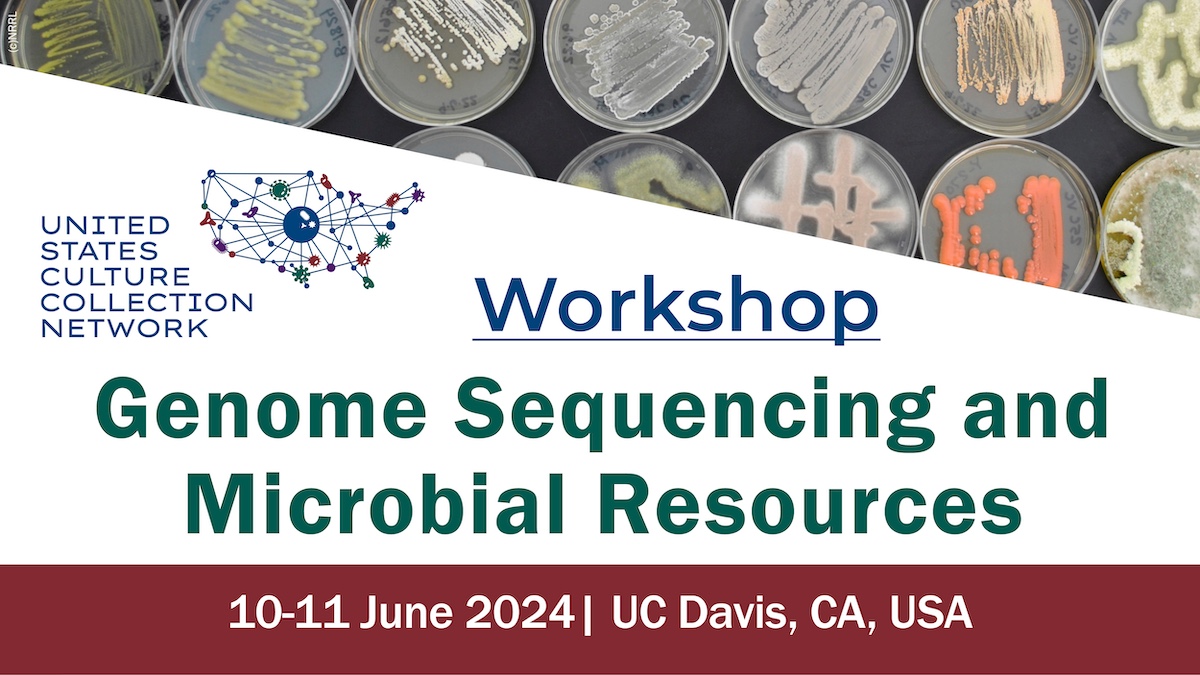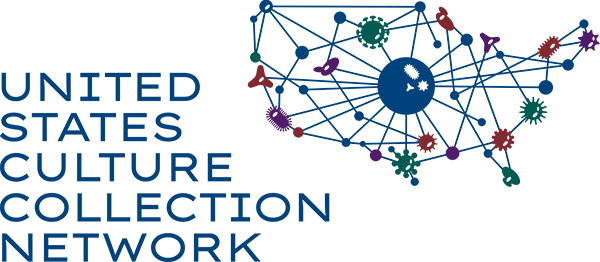“Genome Sequencing and Microbial Resources” workshop
February 19, 2024
June 10, 2024 - June 11, 2024
Location
UC Davis, CA, USA
Outline
The increasing power of DNA sequencing technologies presents new opportunities to utilize microbial specimens and associated data in exciting ways to broaden scientific discovery. This workshop will explore the challenges and opportunities related to microbial genome sequencing, with focus on living microbes, whether sourced from a researcher’s freezer or a large formal repository. Discussions will explore opportunities to integrate phenotypic and genotypic information, specimen and data storage, preservation procedures, licensing of both intellectual and tangible property and emerging requirements of the Nagoya Protocol.
Agenda
Monday, June 10
8:00 am – Registration and badge pick-up
8:30 am – Welcome and Introductions – Dusti Gallagher, USCCN Project Manager
U.S. Culture Collection Network Overview – ![]() Slides
Slides
Session 1: Challenges and Opportunities with Microbial Collections
8:45 am – Panel Discussion – Moderator: Dusti Gallagher
09:45 am – Michael Lomas, Bigelow Laboratory for Ocean Sciences
Implementation of a Specimen Management Plan for federally funded research – ![]() Slides
Slides
10:15 am – Networking Break
Session 2: The Power of Data – Leveraging Collections to Answer Scientific Questions
10:30 am – Edward Dudley, Pennsylvania State University
Leveraging the E. coli Reference Center to identify new serotypes and predict bacteriophage susceptibility
11:00 am – Caitilyn Allen, University of Wisconsin-Madison
Cool Virulence: Drawing on a Legacy Culture Collection to Uncover New Biology – ![]() Slides
Slides
11:30 am – Tiffany Lowe-Power, UC-Davis
Integrating Undergraduate Researchers into Genome Analysis of Bacterial Culture Collections – ![]() Slides
Slides
12:00 pm – Titus Brown, UC Davis
Bioinformatics approaches for making use of microbial genome sequences for taxonomy, function, and pangenomics – ![]() Slides
Slides
12:30 pm – Adam Newman, Ginkgo Bioworks
Using genomic and phenotypic data to realize value from a microbial strain collection: an industrial perspective
1:00 pm – Networking Lunch
Session 3: Unique Opportunities and/or Projects Within the Collections and Scientific Communities
2:15 pm – Tanja Woyke & Rekha Seshadri, JGI
The Joint Genome Institute’s User Programs – ![]() Slides
Slides
Unlocking Insights from Isolate Genome Collections – ![]() Slides
Slides
3:00 pm – Lutz Froenicke, The Genome Center, UC Davis
High-throughput Omics at the Genome Center Cores
3:30 pm – Marco Riojas, ATCC
BEI Resources: Supporting the Infectious Disease Research Community – ![]() Slides
Slides
4:00 pm – Maher Al Rwahnih, NCPN-Grapes, UC-Davis
Quality Control at Foundation Plant Services
4:30 pm – Open Discussion/Q&A
4:50 pm – Special Recognition presented by Kyria Boundy-Mills
5:00 pm – Wrap-up Day 1 & Announcements
5:30 pm – 7:00 pm: Networking Reception with Hors D’oeuvres – UC-Davis Winery Classroom
Tuesday, June 11
7:55 am – Welcome & Announcements
Session 4: The Nagoya Protocol: Potential Impacts on Data, Information, Licensing & Agreements
8:00 am – Amber Hartman-Scholz, DSMZ
Who “owns” (microbial) biodiversity? From the Nagoya Protocol to the Digital Sequence Information debate – ![]() Slides
Slides
8:30 am – Matthew Ryan, CABI
CABI’s approach to the Nagoya Protocol on ABS – An international perspective – ![]() Slides
Slides
9:00 am – Q&A & Discussion
9:30 am – Dianna Francis, UC-Davis
Intellectual property and tangible property licensing – ![]() Slides
Slides
10:10 am – Q&A & Discussion
10:40 am – Workshop Wrap-up and Tour Announcements
10:45 am – Networking Break
Session 5: Collection Tours
11:15 am – Departure for Morning Tours
- 11:30-12:00 | Tour #1: UC-Davis Teaching Brewery
- 12:00-12:30 | Tour #2: UC-Davis Teaching Winery
12:45 pm – Box lunch, UC-Davis Alumni Center
1:30 pm – Departure for Afternoon Tours
- 1:45-3:00pm | UC-Davis Bohart Museum of Entomology
- Wildlife Collection
- Insect Collection
3:30pm – End of Workshop
Practical information
The workshop will take place at the Walter A. Buehler Alumni Center
University of California, Davis
530 Alumni Ln, Davis, CA 95616, USA
Accommodation
The closest hotel to the venue is the Hyatt Place UC Davis, located at walking distance (5 minutes) from the workshop venue. There are several other hotels in the city of Davis, very close to the UC Davis campus.
